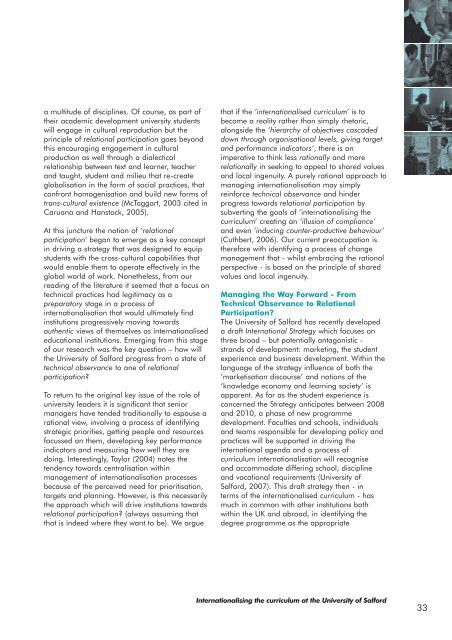HE senior mgrs_Apr18 - Bournemouth University
HE senior mgrs_Apr18 - Bournemouth University
HE senior mgrs_Apr18 - Bournemouth University
You also want an ePaper? Increase the reach of your titles
YUMPU automatically turns print PDFs into web optimized ePapers that Google loves.
a multitude of disciplines. Of course, as part oftheir academic development university studentswill engage in cultural reproduction but theprinciple of relational participation goes beyondthis encouraging engagement in culturalproduction as well through a dialecticalrelationship between text and learner, teacherand taught, student and milieu that re-createglobalisation in the form of social practices, thatconfront homogenisation and build new forms oftrans-cultural existence (McTaggart, 2003 cited inCaruana and Hanstock, 2005).At this juncture the notion of ‘relationalparticipation’ began to emerge as a key conceptin driving a strategy that was designed to equipstudents with the cross-cultural capabilities thatwould enable them to operate effectively in theglobal world of work. Nonetheless, from ourreading of the literature it seemed that a focus ontechnical practices had legitimacy as apreparatory stage in a process ofinternationalisation that would ultimately findinstitutions progressively moving towardsauthentic views of themselves as internationalisededucational institutions. Emerging from this stageof our research was the key question – how willthe <strong>University</strong> of Salford progress from a state oftechnical observance to one of relationalparticipation?To return to the original key issue of the role ofuniversity leaders it is significant that <strong>senior</strong>managers have tended traditionally to espouse arational view, involving a process of identifyingstrategic priorities, getting people and resourcesfocussed on them, developing key performanceindicators and measuring how well they aredoing. Interestingly, Taylor (2004) notes thetendency towards centralisation withinmanagement of internationalisation processesbecause of the perceived need for prioritisation,targets and planning. However, is this necessarilythe approach which will drive institutions towardsrelational participation? (always assuming thatthat is indeed where they want to be). We arguethat if the ‘internationalised curriculum’ is tobecome a reality rather than simply rhetoric,alongside the ‘hierarchy of objectives cascadeddown through organisational levels, giving targetand performance indicators’, there is animperative to think less rationally and morerelationally in seeking to appeal to shared valuesand local ingenuity. A purely rational approach tomanaging internationalisation may simplyreinforce technical observance and hinderprogress towards relational participation bysubverting the goals of ‘internationalising thecurriculum’ creating an ‘illusion of compliance’and even ‘inducing counter-productive behaviour’(Cuthbert, 2006). Our current preoccupation istherefore with identifying a process of changemanagement that - whilst embracing the rationalperspective - is based on the principle of sharedvalues and local ingenuity.Managing the Way Forward - FromTechnical Observance to RelationalParticipation?The <strong>University</strong> of Salford has recently developeda draft International Strategy which focuses onthree broad – but potentially antagonistic -strands of development: marketing, the studentexperience and business development. Within thelanguage of the strategy influence of both the‘marketisation discourse’ and notions of the‘knowledge economy and learning society’ isapparent. As far as the student experience isconcerned the Strategy anticipates between 2008and 2010, a phase of new programmedevelopment. Faculties and schools, individualsand teams responsible for developing policy andpractices will be supported in driving theinternational agenda and a process ofcurriculum internationalisation will recogniseand accommodate differing school, disciplineand vocational requirements (<strong>University</strong> ofSalford, 2007). This draft strategy then - interms of the internationalised curriculum - hasmuch in common with other institutions bothwithin the UK and abroad, in identifying thedegree programme as the appropriateInternationalising the curriculum at the <strong>University</strong> of Salford33





![[2012] UKUT 399 (TCC)](https://img.yumpu.com/51352289/1/184x260/2012-ukut-399-tcc.jpg?quality=85)




![Neutral Citation Number: [2009] EWHC 3198 (Ch) Case No: CH ...](https://img.yumpu.com/50120201/1/184x260/neutral-citation-number-2009-ewhc-3198-ch-case-no-ch-.jpg?quality=85)





